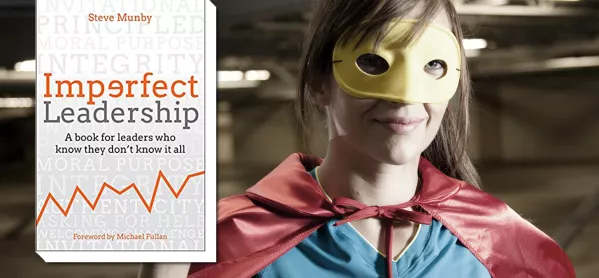- Home
- Book review: Imperfect Leadership
Book review: Imperfect Leadership

Imperfect Leadership: A book for leaders who know they don’t know it all
Author: Steve Munby
Publisher: Crown House Publishing
Details: 320 pages; £20.00
ISBN: 978-1785834110
Steve Munby is one of those revered and beloved characters who has been entrenched in our educational landscape for a long time. Being asked to review his book is a bit like being asked to comment on your favourite uncle’s life work - you approach it with a fondness and a desire to say great things.
On opening the book, there are no fewer than 18 plaudits from the great and good of education saying what a masterpiece it is. Reading these I froze and thought: what if I don’t like it? What if it brings nothing new? I didn’t want to be the one going against the tide.
But I needn’t have worried. While Imperfect Leadership focuses on 12 keynote speeches given over 12 years -most of which I’d heard at the time - there is so much more to it than that. It’s part autobiography, where Steve reflects on his own leadership journey through the various organisations he has led, part social commentary on the political and educational context he needed to navigate, and part leadership manual, exemplifying and demystifying pretty much all of the main leadership paradigms of the past 20 years.
Fallible leader
The concept of the fallible leader isn’t new, but it’s the way in which Steve shares his worries, fears and thoughts each time he faced a new challenge that gives real credence to the idea that it’s OK not to be the hero leader, and that to doubt yourself is a strength.
When he took up the reins of the National College for School Leadership, Steve had a strong track record in local authorities, but no experience of headship. This caused a stir and a number of raised eyebrows, particularly within the government that had appointed him. To have your appointment questioned by your paymasters, and to know that the eyes of school leaders across the country are on you, is enough to shake the resolve of the hardiest of people.
Steve’s response to this was reassuringly practical: he found himself the very best mentors and engaged and involved as many leaders as possible in shaping the vision of the college. Given its overall success, it is a good reminder for us all to keep it simple.
In particular, as someone who struggled with the workings of the National College, and at times really questioned some of the activities in which it got involved, I find it fascinating to discover that Steve too felt that, on occasion under his leadership, the college lost its way. Again, this message that leadership is about honest reflection is gold dust.
Honesty and humility
In fact, what shines through the book is Steve’s honesty and humility. We are taken willingly along on his journey of self-discovery as a leader. As I read the developing history of the college, I was reminded just how many of today’s forces for school improvement - teaching schools, national leaders of education, to name just a couple - had their genesis in the college, and we should all be grateful for this legacy.
As far a social commentary is concerned, the book provides real insight into the evolving educational context over more than a decade, in terms of educational reform and policymaking. It paints a vivid picture of what it’s like to work with ministers and various government departments and quangos. In places, it’s almost a warts-and-all exposé of what needs to be done to survive and navigate the education sector when leading a national organisation. If that makes for uncomfortable reading, then good, because that’s just how it is.
It’s a salutary lesson to us all that we can’t be so naïve as to think that political agendas won’t influence the decisions we take as leaders. In relating this part of his leadership history, it’s a sign of Steve’s integrity and bravery that he names names (no spoilers!) and calls people out when they don’t meet the standards we should expect of them, and when political agendas took precedence over doing what was right.
Leadership bible
Steve’s speeches focused on the need for leadership to respond to the changing landscape, and each one adds another dimension to what is almost a leadership framework that can guide us all in whatever role we find ourselves.
We are taken through pretty much every paradigm of leadership over the past 10 years, focusing on ethics, authenticity, adaptability, power and even love. The speeches are as relevant now as when he delivered them. The narrative he provides as he explains why he chose each theme and why it resonated at the time exemplifies the leadership concept so clearly as to make it accessible and useful to all, whether a middle leader new in post or an experienced chief executive.
I imagine this will become a leadership bible. And rightly so.
Sir Steve Lancashire is CEO, REAch2 Academy Trust. He tweets @stevereach2
You can support us by clicking the title link: we may earn a commission from Amazon on any purchase you make, at no extra cost to you.
Keep reading for just £1 per month
You've reached your limit of free articles this month. Subscribe for £1 per month for three months and get:
- Unlimited access to all Tes magazine content
- Exclusive subscriber-only stories
- Award-winning email newsletters

